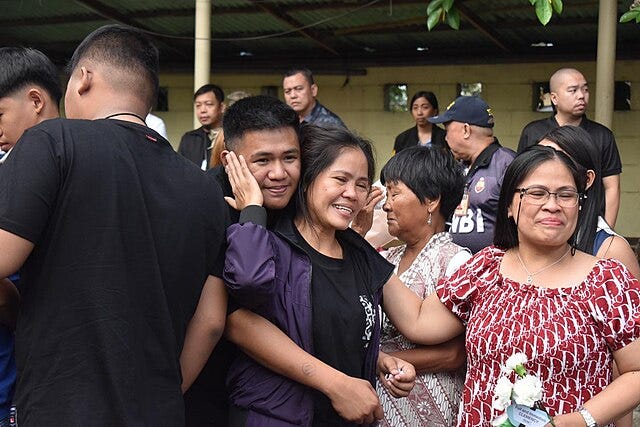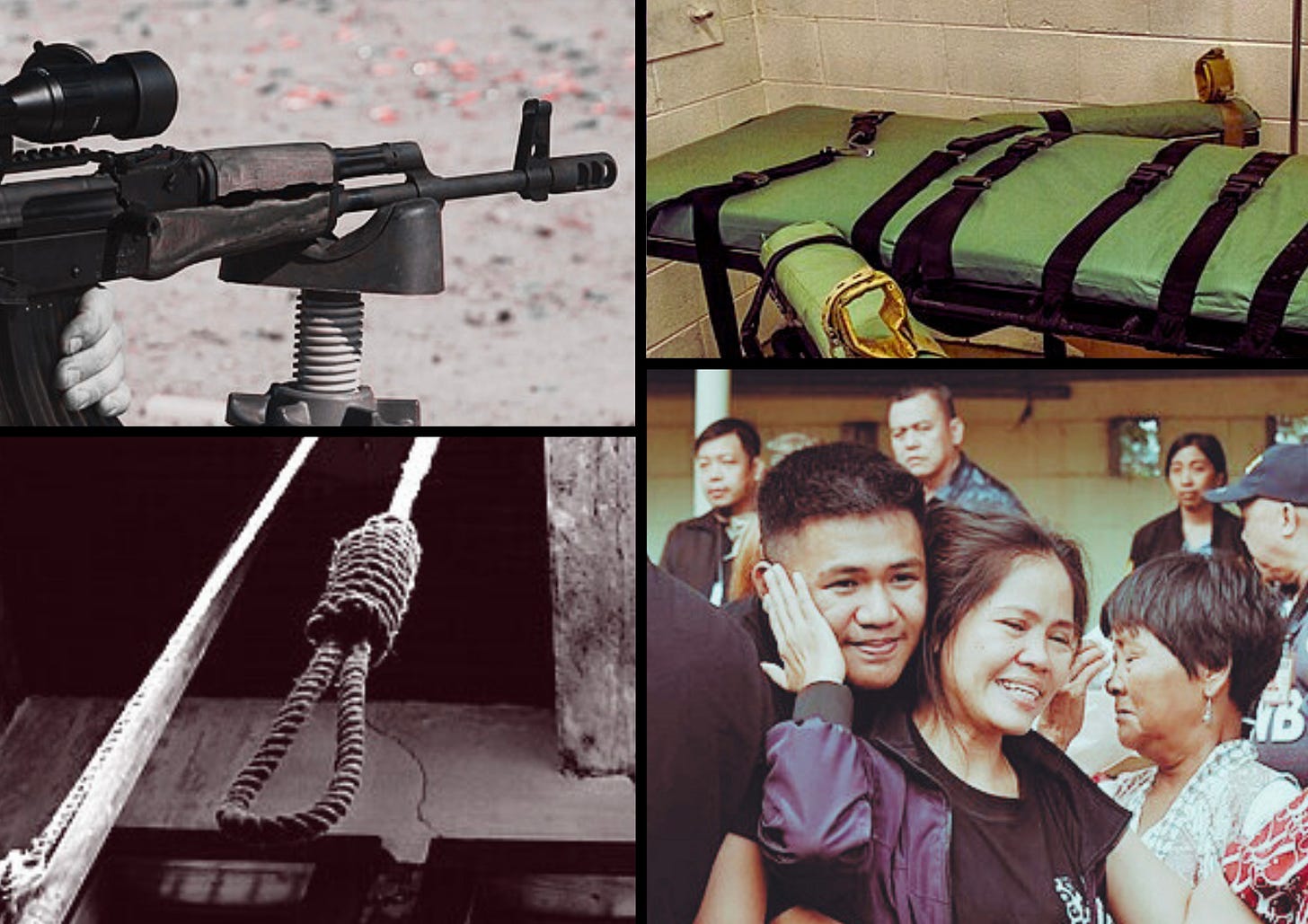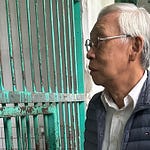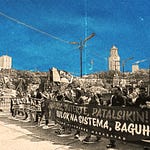In 1967, just before 8 o’clock in the morning on February 3rd, Ronald Ryan drank a small shot of whisky and was escorted into Pentridge Prison’s execution chambers in the Australian state of Victoria. The 41-year-old convicted murderer was led to the gallows, said to the executioner, “God bless you, please make it quick”, and had a noose placed around his neck. Moments later, the trapdoor was released from under his feet and he was hanged to death.
At the same time his execution was being carried out, anti-death penalty campaigners and supporters of Ryan — who had always maintained his innocence — observed a three-minute silence across Australia. In Pentridge Prison, inmates staged a sit-in and refused to leave their cells in protest over the state-sanctioned killing.
Despite calls for death sentences for serious crimes coming from leading Australian politicians in the 60s (including from then-Victoria premier Henry Bolte, who had led an intense but unsuccessful campaign to execute convicted murderer Robert Tait in 1962), national public opinion had demonstrably turned against the death penalty. Ryan was the last person executed in Australia, and capital punishment was fully abolished in all states by 1985.
30 years later, the death penalty caused outrage in the country again, after two young Australian men — Andrew Chan and Myuran Sukumaran, accused of being ringleaders of the the Bali Nine — were condemned to die in Indonesia after being convicted of attempted drug smuggling. Despite petitions from the Australian government to spare their lives and widespread outcry from the Australian public, the pair were executed by firing squad in April 2015.
The Bali Nine case and deaths of Chan and Sukumaran triggered a clear societal and political shift, leading to Australia becoming an active leader in the global movement for the abolition of the death penalty.
Introspection and self-reflection
Opposition to the death penalty in Australia remains strong — both at societal and political levels — and recent polls have shown that 69% of Australians oppose capital punishment, even for murder.
Generally speaking, Aussies really dislike the death penalty.
But this vehement opposition to capital punishment has led to further complications in the murkier waters of geopolitics and international police cooperation. Despite abolishing the death penalty domestically, the Australian authorities continue to aid and assist police in retentionist countries, sometimes in criminal investigations which could lead to death sentences.
Take the Bali Nine case: in 2006, after finding out that nine Australian citizens were attempting to smuggle illegal narcotics on a flight from Bali to Australia, the Australian Federal Police (AFP) tipped off the Indonesian authorities, leading to the arrest and conviction of the would-be drug couriers. About a decade later, two of the nine were taken outside an Indonesian prison and shot — deaths many in Australia saw the AFP as being complicit in.

In the years since, the AFP has cooperated in similar ways with numerous other countries, some with even harsher drug laws or under authoritarian governments notorious for their human rights abuses. “The AFP, since the military junta has been in power in Myanmar (in 2021), has responded to over 290 information requests, I believe on drug trafficking,” says Elizabeth Wood, CEO of the Australia-based abolitionist group the Capital Punishment Justice Project (CPJP).
“We know that Myanmar has the mandatory death penalty for some drug offences, so it doesn’t seem unreasonable to say that even if it’s at the very low end of some pretty minor information, then that ultimately could lead to the case where someone is arrested and face the death penalty.”
“I remember having conversations with representatives from the AFP saying ‘we want this loop to be closed’,” adds Sara Kowal, Director of Eleos Justice at Monash University’s Law department and Vice-President of CPJP. “It’s about why are we participating? Why is the Australian Federal Police giving information that could result in anyone being executed. They do have guidelines, and they would say that they’re following the guidelines, but the guidelines need to be reviewed.”
Cases such as these have led to considerable introspection as to what, exactly, Australia’s role should be with regard to the death penalty — not just domestically, but also internationally.
A leading voice on abolition
In 2018, Australia introduced a bipartisan strategy to end capital punishment. Its statement of intent was unambiguous:
‘Australia opposes the death penalty in all circumstances for all people. We support the universal abolition of the death penalty and are committed to pursuing this goal through all the avenues available to us.’
“Part of that policy was to say, ‘Well, we are the best placed in the Asia-Pacific region to be a leading voice on abolition’,” says Sara.
Globally, there’s an ongoing shift away from the death penalty. More and more countries are either fully abolishing state-sanctioned killings or holding back from carrying out executions even if capital punishment remains on the books. This has even been noticeable in drug-averse nations across Southeast Asia: capital punishment has been fully abolished in the Philippines and Cambodia, while Malaysia scrapped the mandatory death penalty in 2023, bringing its death row population from over 1,200 people to just 140.
Despite this worldwide trend, a number of retentionist countries have doubled down on capital punishment. Singapore, for instance, continues to insist that mandatory death sentences — even for non-violent offences such as drug trafficking — are instrumental in maintaining public safety and national security. Iran has ramped up its use of state-sanctioned killings, often in an attempt to quash political dissent. Data on executions in countries like China and Vietnam is scarce, but it’s estimated that the annual number of executions in the former could number in the thousands.
Accusations of foreign interference and the impositions of western values are regularly trotted out by retentionist nations to deflect international criticism. In some cases, they also point fingers at those applying international pressure, reminding their critics that their hands aren’t completely clean either, and while this ‘whataboutism’ has long been a staple of bad faith arguments, it can sometimes work because there is some truth behind the criticism. A case in point is Australia’s poor human rights record when it comes to its treatment of indigenous people and refugees, with accountability and change required in those areas. But anti-death penalty activists argue that this doesn’t — and shouldn’t — invalidate the Australian government’s position on capital punishment.
“We would never say that Australia has a perfect human rights practice,” says Elizabeth. “I guess in some ways the abolition of the death penalty is somewhat safe ground for Australia to take a really principled stand. I wouldn’t want it to distract from the areas where Australia can improve its human rights practices, but I also wouldn’t want to throw that out and say the stance on the death penalty is irrelevant or diminished because of how our government acts in other ways.
“You take the wins where you can. This is something where Australia has taken a really strong stance, and it appears we’ll continue to do so.”
These sentiments are echoed by Sara, who emphasises the importance of cross-border cooperation among anti-death penalty activists. Although defensive officials from retentionist states might fling around accusations of foreign meddling, the fact remains that there are human rights defenders on the ground in those countries who need, and want, the support and solidarity from groups like CPJP. “What’s the option? To do nothing? That’s not an option,” she says. “You’re only ever going to have effective campaigning if you’re led by the experts and the people living in those circumstances.”
‘You take the wins where you can’
Anti-death penalty work is often Sisyphean in nature, both for those in retentionist countries, and for others campaigning internationally. But there have been instances where international and domestic pressure combined have saved lives.
Indonesia — which last staged a round of executions in 2016 — seems to have put a hold on carrying out death sentences. While no official reason has been given (there’s nothing to definitively indicate that executions couldn’t suddenly resume) some abolitionists speculate that this is due to the international fallout from the executions of Chan and Sukumaran in 2015.

Another indication that Indonesia might be pulling away from the death penalty is the recent repatriation of Mary Jane Veloso, a Filipino woman and former domestic worker who was convicted of drug smuggling in 2010.
Veloso had been arrested in Indonesia after airport security discovered 2.6kg of heroine stitched into the inner lining of her luggage; she was sentenced to death the same year, but adamantly maintained her innocence throughout her time incarcerated. “She’s [widely] recognised as someone who’s been the victim of human trafficking,” says Sara. “She meets the UN definition; she meets the ASEAN (the Association of Southeast Asian Nations) definition. So the fact [she was] kept on death row for that length of time — or for any length of time — is appalling.”
Veloso barely escaped the firing squad in April 2015. She’d originally been scheduled to be executed alongside Chan and Sukumaran, but was pulled out of line at the last minute. “I met a social worker who was with her family that night on the island, and her family had to hear the [gunshots], and they weren’t told until several hours afterwards that their mum had been pulled off death row,” Sara says.
“That story was an amazing result of incredible advocacy and lawyering from lawyers in the Philippines and in Indonesia, and with huge public protests in the Philippines to really campaign for Mary Jane.”
Over the years, Veloso found herself at the centre of bilateral discussions between the Indonesian and the Philippine governments, while activists in both countries continued to fight for her case. After years of political manoeuvring and campaigning, Veloso was repatriated in 2024. Though still in prison in the Philippines, local authorities have said her case will be thoroughly reviewed, and many believe that she might finally be released soon. For now, she’s still waiting to testify against the recruiters who allegedly trafficked her.
In previous editions
In this latest episode of the Currents podcast, Elizabeth and Sara talked about these issues and more, giving us a glimpse at the work that CPJP has been doing over the years. This follows on from the first half of our interview, where they discussed how they became involved in the anti-death penalty movement, the often bizarre nature of the implementation of capital punishment, and some of the moments which have deeply influenced their work:
This week, I also published my interview with Art Pangilinan, a former death row inmate who spent almost 31 years in prison in the Philippines, and his wife Dolly.
While Art was in prison, Dolly — a housewife and single mother — became heavily involved in the Philippine anti-death penalty movement. She began lobbying politicians after joining an organisation made up of families of death row prisoners, eventually becoming its president. Art, meanwhile, would go onto turn his life around, finding religion and (after his sentence was commuted from death to 40 years imprisonment) training to become a painter.
Both episodes offer incredible insights into ways the death penalty affects lives: Art and Dolly’s story showing the impact it can have on the families of death row inmates, Elizabeth and Sara’s interview offering an in-depth discussion on the realities of anti-death penalty activism and how it affects those involved in working for global abolition.













